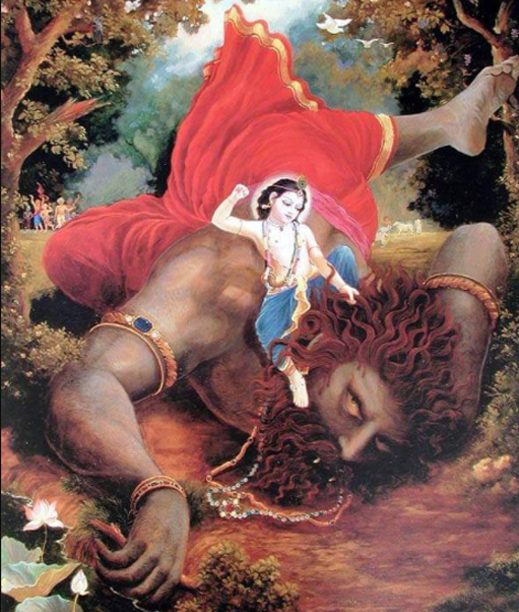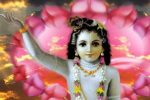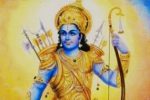NAME 75
Vikramī – विक्रमि
He is Courageous
Vikrami has two meanings:
He who is ever a courageous One, is Vikrami. Sri Parasara Bhattar points out that the name signifies His Nature and dispels all possibilities of anything going against His Will or desire.
Vikrami also refers to Bhagavan’s Vamana Avataar. Vikrami is one who has the “Special” footsteps referring to his transformation from the dwarf Vamana to the gigantic Trivikrama resulting in his giant strides.
Vikrama means valour or bravery. Vikrami is a person of great courage and valour. Sri Adi Sankara says ‘Vikramah Shouryam Tadyogaat Vikrami – He is called Vikrami because of his great valour’.
Vikramin means striding or the long steps. Three famous steps of Viṣṇu are well known during His Vāmna avatar. The three steps of Viṣṇu refer to His action of pervading the universe through icchā jñāna and kriya śakti-s. They refer to desire, wisdom and action that are present in every human being. Status of a being depends upon the predominance of any of the three types of śakti-s. The Brahman interpenetrates the universe with these three kinds of subtle powers.
Vikrama means courage. The Brahman has to be courageous as He has to perform the three acts of creation, sustenance and dissolution.
Rig Veda (I.22) talks about the Supreme step of Viṣṇu.
tad viṣṇoḥ paramam padaṁ sadā paṣyanti sūrayaḥ
तद् विष्णोः परमम् पदं सदा पष्यन्ति सूरयः
The supreme step of Viṣṇu, His highest seat, is the triple world of bliss and light, His Supreme feet is seen continuously by the wise, like eye fixed on Heaven. This makes the difference between a yogi and an aspirant. Yogi always stands connected with the Pure Consciousness, the Brahman. An aspirant goes up and down and does not stay connected with Him all the time. The former does not accrue karma because of his eternal connection with Him and the latter accrues karma, whenever he performs actions with lower level of consciousness, attached with ego.
This term commemorates how the Lord, as Vamana, measured with His tiny three steps all the three worlds.
The Story of Vamana Avataar
The Puranas describe that Vishnu descended as a Vamana (Dwarf Brahmin) to restore the authority of Indra over the heavens, as it had been taken over by Mahabali, a benevolent Asura King. MahaBali was the great grandson of Hiranyakshipu and the grandson of Prahlada.
King MahaBali was a generous man who engaged in severe austerities and penance and won the praise of the world. This praise, from his courtiers and others, led him to think of himself as the greatest person in the world. He believed that he can help anyone and can donate whatever they ask. Even though he became benevolent, he became pompous of his activities and forgot that the Almighty is above him. Dharma says that one should do his duty without any pride and helping others is the duty of a righteous King. Mahabali was a devoted worshiper of the Lord. The Story amply demonstrates that the Almighty, the ParaBrahmam is neutral and unbiased; He only tries to balance nature. He showers his divine light to all, irrespective of what they do.
Vamana, in the guise of a dwarf Brahmin carrying a wooden umbrella, went to King MahaBali’s Yagna to request three paces of land. Mahabali consented, against the warning of his Guru, Shukracharya. Shukracharya, annoyed with the pride of the King, shrinks himself with his powers and sits in the spout of the Kamandalu, from which water has to be poured to seal the promise to the deity in disguise. Lord Vishnu, in disguise as the dwarf Brahmin, understands immediately, and picks up a straw from the ground and directs it up the spout, poking out the left eye of Shukracharaya. Since then, the guru of the Asuras has been known to be half blind.
Vamana then revealed his identity and enlarged Himself to gigantic proportions to stride over the three worlds. He covered heaven to earth with the first step and earth to the netherworld with the second. King Mahabali, unable to fulfill his promise, offered his head for the third step. Vamana then placed his foot and gave the King immortality for his humility.
For the humility shown by MahaBali in keeping his promise and giving due recognition for his ancestor Prahlada, the Lord conceded sovereignty of Patala, the netherworld to MahaBali. The giant form of Vamana is known as Trivikrama.
Just before King Mahabali was sent to Patala Loka, he was given permission by Vamana to visit his people once a year.
The Onam festival is celebrated to welcome MahaBali back to his lost Kingdom. During this festival, beautiful floral decorations are made in every house and boat races are held throughout Kerala. A twenty-one-course feast is an important highlight of the Onam festival known as the ‘Onam Sadhya’.
Mahabali symbolises Ahankar or Ego, the three feet symbolises the three planes of existence (Jagrat, Swapna and Sushupthi i.e. Awake, Dream and Deep Sleep State) or (Sthula, Sukshma and Karana Sharira i.e. Gross, Subtle and Causal body) and the final step is on his head which elevates him from all the three states to grant him Jeevan-Mukti.
७५. ॐ विक्रमिणे नमः |
75. OM Vikramiṇe Namaḥ
Vikramee -One full of prowess (Vikrama), courage, daring. Or, it can be One who has “Special foot steps”. This term commemorates how the Lord, as Vamana, measured with His tiny three steps all the three worlds.
Vikramaḥ (śauryaṃ) asya asti / विक्रमः (शौर्यं) अस्य अस्ति Vikrama means prowess. Being associated with it, He is Vikramī.
a) The most courageous, The most powerful.
b) One who has the “Special” footsteps viz. Vamana.
Vikramah Souryam, Tadyogat Vikrami – Vikrama is courage; He, who is ever a courageous One, is Vikrami. One full of prowess (Vikram), courage, daring. Second meaning can be One who has “Special footsteps”.
INTERPRETATION GUIDED BY SANT VANI (WORDS OF SAINTS)
Vikramī (also name 909)
The valiant.
The one who has vikrama, that is, valour, courage, and bravery is called Vikramī. All these qualities are required only by ordinary people. The Lord does not have any enemies to fight against. So why should He have Vikrama? Why should He be called Vikramī? This is only to show that wherever there is any valour, whoever has any courage, all these belong only to the Lord. Wherever there is any glory, that glory belongs to and originates from Īśvara alone.
People think that courage is the absence of fear. That is not true. Courage is doing what needs to be done inspite of fear. Courage comes from focusing on what needs to be done and doing it.
There is a soft drink commercial in India which shows some youth in an adventure sport and has a tag line as ‘dar ke aage jeet hai.’(Victory lies ahead of fear). What is nice and true about this tagline is the acknowledgement of fear. Fear is a universal human emotion and we need not be afraid of it. The youth in the advertisement don’t wallow in fear, build excuses and get paralysed by it. They are afraid. They have the support of their friends. Inspite of fear they go ahead and cross over to the other side.
He who possesses unmatched courage, heroism, valor and daring Vikrama (विक्रम) and bestows that on his devotees OR He who measured the Universe in just three steps (Śaṅkara). He is Vikrama because his nature is such that it dispels all possibility of anything going against his desire or will. He who is most powerful (Parāsara Battar).
In describing the previous name in this string Īśvaraḥ, it was mentioned that some names are “gateway-names” The names that appear after these gateway-names are extremely powerful and are conducive to progress in Sādhana and help channelize the Kriyāśakti (क्रियाशक्ति), Icchā śákti, (इच्छाशक्ति), and Jñānaśakti (ज्ञानशक्ति) in each one of us. Each name in a sense tells us what we can get when we contemplate on that Īśvaraḥ personified as Viṣhṇu.
There is a beautiful Śloka on Hanuman that tells us what he can bestow on those who install him in their hearts:
बुद्धिर् बलम् यशो धैर्यम्
निर्भयत्वम् अरोगताम्
अजाड्यम् वाक् पटुत्वम् च
हनुमत् स्मरणात् भवेत् ॥
Buddhir Balam Yasho Dhairyam
Nirbhayatvam Arogataam
Ajaaddyam Vaak Pattutvam Ca
Hanumat Smarannaat Bhavet ||
बुद्धि (buddhi) – intelligence, बलम् (balam) – strength, यश् (yash) – fame & glory, धैर्यम् (dhairyam) – courage, निर्भयत्वम् (nirbhayatvam) – fearlessness, अरोगताम् (arogatAm) – disease-free health, अजाड्यम् (ajADyam) – determination, वाक् पटुत्वम् च (vAk paTutvam ca) – and felicity with words, are the gifts that he bestows (भवेत्, bhavet) to those who install him in their hearts and meditate (स्मरणात् , smaraNAt) on that divine form of Hanuman (हनुमत्, hanumat).
Even as Hanuman was tearing through the sky across the ocean, first having subdued Mainaaka mountain and then the fierce serpent Surasa, the celestial beings who are watching this speak to themselves: “Oh! we thought he would lose his strength and fall into the Ocean but he seems to be going faster and faster… where does he get this strength from?” They did not know perhaps that deep in Hanuman’s heart he had installed Sri Rāma and with Rāma directing his Kriyāśakti, Icchā śákti and Jñānaśakti (ज्ञानशक्ति) how could he fail. Victory was always his. It is in this context that the above Śloka of Hanuman is interpreted.
This is exactly how these names of Viṣṇu work on that person who has that Supreme Being installed in his heart and does all work as an instrument of that indwelling person – Courage and fearlessness are but just a few of the gifts he bestows. Once installed, he directs and takes over every single atom of the devotee’s body.
In everyday situations, doing what needs to be done (facing an errant boss, confronting a partner on his/her behavior, standing upto unjust behavior within the family, disciplining and taking tough measures with teenage children, dispelling myths about Sanatana dharma, facing peer pressure among friends, resisting social pressure to have the latest gadgets, confronting emotional manipulation of a family member, deciding to adopt a child, being a sadhu etc) require and contribute to courage. Every single person has moments of courage in his or her life, which required the person to go against odds. One needs to recall this from time to time, to recognise one’s own courage in situations, as that will pole vault one into further situations that require firm, decisive, courageous actions.
Recognising our own courage is recognisng Īśvarah’s valiance. If Indra, the Lord of the devas, has some glory, he should not think ‘I have this valour,’ because, even that glory belongs to the Lord. The Kenopaniṣad mentions this story. There was a fight between the devas and the asuras and due to the grace of Īśvara, the devas won. They got all the praise and they became very proud since they had won the war. Īśvara then thought that the devas had to be taught a lesson.
The Lord assumed a celestial form and appeared before the devas. Indra and the other devas did not know who this effulgent being was. So Agni went to find out about this effulgent form and he failed. Similarly all the other devas also tried to find out and failed. Finally Indra prayed and then in the place of the celestial being, Brahma-vidyā appeared as Uma. She taught Indra and the
others that, ‘He is the eye of the eye, the ear of the ear, the mind of the mind, the speech of speech and the life of life. Intelligent men, by knowing Him and the reality of this world, become immortal.’
Thus, Indra and the other devas, who are great Vikramīs, learnt that wherever there is Vikama, it belongs only to Īśvara. So He is the God of all gods and all the glories belong only to Him. He is the real Vikramī.
Recognising this, keeps us objective and seeking refuge in the Vikramī helps us focus on what needs to be done. Further, in His avatāras as Śrī Rāma, Śrī Kṛṣṇa, Paraśurāma and others, He manifests great Vikrama.
“It’s okay to be strong sometimes but most other times we must find a way to express ourselves. Being strong does not mean that you keep on putting up with everything. Strength is not the same as endurance. Strength is how much you can pull along whereas endurance is how much you can put up with. To be strong is to face something with courage but it certainly does not imply that you do so silently. It’s not resilience but ignorance if you ask me.
Next time someone tells you to be strong, thank them for the advice but follow your own voice. Don’t be strong if it’s actually making you weak. Take it easy. Don’t the tender blades of grass outlive the giant firm trees that fall in the face of severe storms?
It’s okay to pull back your elbow if you don’t feel like getting soaked. Life is not a boot camp that you can only learn by harsh and rigorous training. Maybe it’s a splendid work of art and some colors, a few gentle strokes, an eye for beauty is all it takes to give it a purpose, to appreciate and enjoy it. Let’s paint it softly, elegantly, not necessarily strongly.”– Om Swami
PLEASE READ



